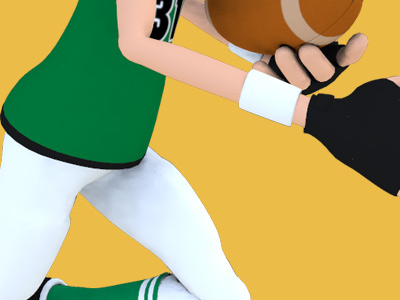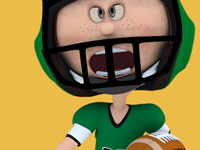American football

Holder (H)
In American football and Canadian football, the holder is the player who receives the snap from the long snapper during field goal or extra point attempts made by the placekicker. The holder is set on one knee 7-8 yards behind the line-of-scrimmage. Before the play begins he places the hand which is closest to the place kicker on the ground in a location designated by the kickers foot (In high school games, the holder/kicker combo is responsible for a kicking block, which lifts the ball off of the turf), with his forward hand ready to receive the snap. After receiving the snap, the holder will place the football on the turf, or block, ideally with the laces facing the uprights and the ball accurately placed where the back hand was initially, then balancing the ball with one or two fingers until the ball is kicked.
The holder, like the placekicker and the long snapper, is protected from intentional contact from the opposing team. The penalty for roughing the holder is 15 yards and an automatic first down.
Depth chart position
Compared to other American football positions, the holder is one of the most trivial positions, requiring precision in the receipt of a snap and placement of a ball in short time, but requiring far less physical talent than a skill position and much less bulk or strength than a lineman. Because of this, it is exceptionally rare for a team to preserve a roster spot solely for a placekick holder; most teams will instead use a player who plays another position to double as the holder. One notable exception was Patricia Palinkas, the first female professional football player; Palinkas played holder (and no other position) during her short time as a pro player.
The holder's actual position, on the team's official depth chart, is generally either the punter or the backup quarterback. Some high school football teams will place a wide receiver or running back at the holder position because of their good hands (this is not unheard of at other levels; Steve Tasker, a wide receiver and punt gunner, also played holder at various times in his NFL career, as does his son Luke Tasker, also a wide receiver).
Backup quarterback
The rationale for having a backup quarterback holding is that the quarterback is accustomed to receiving snaps from center and long snaps from the shotgun formation. He also provides a threat for a fake field goal since the quarterback can throw a pass on such plays. Additionally, in the event of a bad snap and an aborted kick attempt, the holder might have to become the quarterback for the play, so having an actual quarterback helps in that regard. Years ago in the NFL, backup quarterbacks generally held for field goal kicks.
Having the backup quarterback play as the holder has faded out in the NFL, mainly due to a rule in the NFL's collective bargaining agreement that prohibited a team's third-string quarterback from playing except in emergencies (this was repealed in the 2011 CBA, but since that time, most NFL teams have only carried two quarterbacks on the active roster). However, such usage has remained rather common in collegiate football. Many times a quarterback who was a redshirt freshman will serve as the holder his sophomore year. It is also common in other professional leagues such as the Arena Football League (where there is no punting and are thus no punters) or the Canadian Football League, where roster size restrictions generally result in one person serving as both placekicker and punter.
Punter
In today's NFL, most teams use their punter as holder, the logic being that punters and placekickers have more free-time to lollygag during practice, and punters are used to handling snaps from the long snapper.
Other responsibilities
During a "fake field goal" attempt the holder may pick the ball up and either throw a forward pass or run with the ball (i.e., act as the quarterback would on a standard play). In addition, the holder may attempt a run or pass if the snap is botched and a successful kick is unlikely. However, this rarely succeeds; the holder is usually tackled promptly.
There can also be a holder during kickoffs and free kicks, but this is reserved for when the ball tee cannot keep the ball up by itself, usually due to wind. In such a case, the holder can be of any position.
SPORTS



American Football
Game play in American football consists of a series of downs, individual plays of short duration, outside of which the ball is dead or not in play. These can be plays from scrimmage – passes, runs, punts, or field goal attempts (from either a place kick or a drop kick) – or free kicks such as kickoffs and fair catch kicks. Substitutions can be made between downs, which allows for a great deal of specialization as coaches choose the players best suited for each particular situation. During a play, each team should have no more than 11 players on the field, and each of them has specific tasks assigned for that specific play.
Rules and gameplay
- Scoring
- Maneuvers
- Strategy
- Play types
- Penalties
- Turnovers
- Downs
- Teams and positions
- Field
- Equipment
- Duration and time stoppages
- Advancing the ball and downs
- Kicking
- Officials and fouls
Positions
Offensive (Interior) line
Backs and receivers
Defensive line
Linebackers
Defensive backs
Special teams
- Kicker (K)
- Holder (H)
- Long snapper (LS)
- Punter (P)
- Kickoff specialist (KOS)
- Kick returner (KR) and Punt returner (PR)
- Upback
- Gunner
- Jammer


RESOURCES
This article uses material from the Wikipedia articles "American football", "American football positions" and "Holder (gridiron football)", which is released under the Creative Commons Attribution-Share-Alike License 3.0.
© Stories Preschool. All Rights Reserved.





